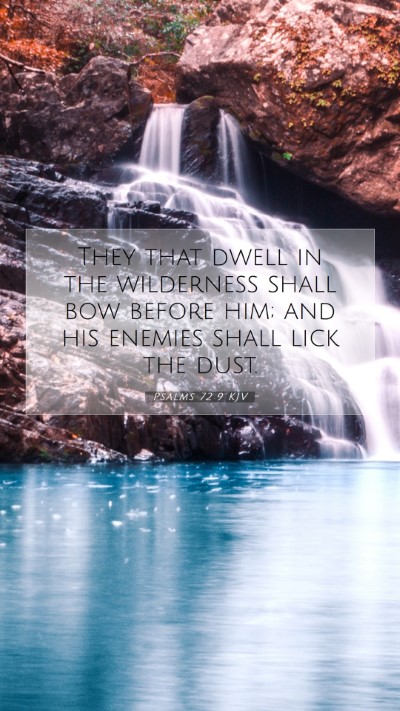Psalms 72:9 - Understanding the Verse
Bible Verse: Psalms 72:9
This verse states: "They that dwell in the wilderness shall bow before him; and his enemies shall lick the dust."
Overview of Psalms 72
Psalms 72 is a royal psalm associated with Solomon, expressing the greatness of his reign. It reflects a longing for a king who embodies justice and righteousness. The psalmist envisions a ruler who will establish peace and order, not only in Israel but over all nations.
Meaning of Psalms 72:9
This verse signifies the extent of the king's dominance and the reverence he will command, even from those in remote places (the wilderness). It suggests that all will recognize his authority, and even his enemies will be brought low.
Insights from Public Domain Commentaries
-
Matthew Henry:
Henry interprets this verse as emphasizing that the king's reign will extend to the most desolate regions. The "wilderness" refers to those who live far from civilization, indicating that even they will submit to the king's sovereignty. His enemies will be humbled, symbolized by "licking the dust," demonstrating absolute submission.
-
Albert Barnes:
Barnes points out that the expression signifies the totality of the king's authority, extending beyond the borders of Israel to other countries and peoples. The imagery of licking dust implies a posture of defeat and submission, indicating that all will acknowledge the king's power, including those who previously opposed him.
-
Adam Clarke:
Clarke explains that the verse suggests a fulfillment of divine prophecy regarding the king's reign. He emphasizes that it reflects on the power of God to bring about humility in those who oppose Him, reinforcing the idea that no one can stand against His anointed leader.
Application of Psalms 72:9
This verse holds significant importance for personal reflection and understanding of God's sovereignty. It invites readers to consider how we recognize authority and the implications of submission in our own lives.
Lessons from the Verse
- Recognition of Authority: Just as the wilderness inhabitants bow before the king, we are called to acknowledge the authority in our lives, whether it be God in a spiritual sense or earthly leaders.
- Consequences for Opposition: The imagery of enemies licking dust reminds believers about the importance of aligning with God’s purposes to avoid defeat and humiliation.
- Peaceful Submission: True power is exhibited not through mere force, but through recognition and submission to rightful authority, leading to peace and order in our lives.
Relevant Cross References
- Psalms 2:10-12: This passage highlights the call to nations to serve the Lord with fear and rejoice with trembling.
- Isaiah 49:23: Kings shall be your nursing fathers, showing the reverence nations hold for God's chosen leaders.
- Philippians 2:10-11: At the name of Jesus, every knee should bow, portraying the ultimate authority of Christ over all.
Conclusion
Psalms 72:9 invites readers to understand the profound implications of acknowledging divine authority in our lives. By examining insights from respected commentaries such as those by Matthew Henry, Albert Barnes, and Adam Clarke, we can glean important lessons about submission, reverence, and the far-reaching influence of a righteous leader. This verse serves as a reminder of the absolute power that governs our lives, urging us to reflect on our relationship with authority—both earthly and divine.
Further Study
Engaging in Bible study groups or utilizing online Bible study tools can help deepen your understanding of such passages. Consider exploring Bible study resources and guides to facilitate discussions around themes found in Psalms 72, including the characteristics of rightful leadership and the nature of submission to God's will.


